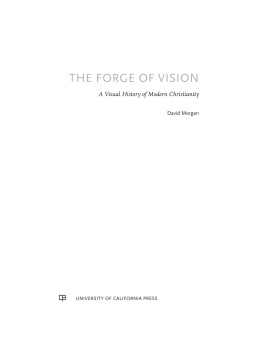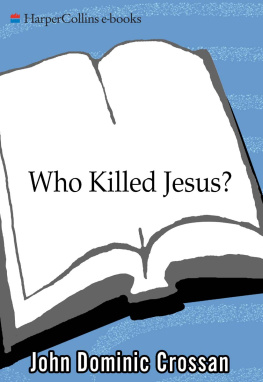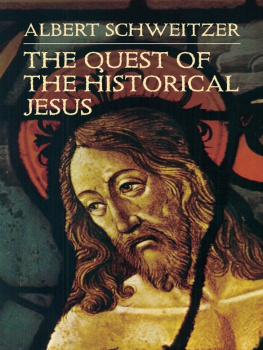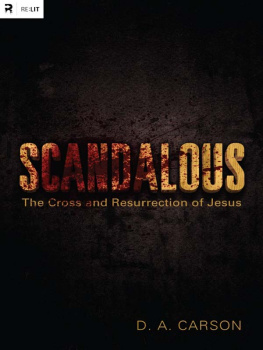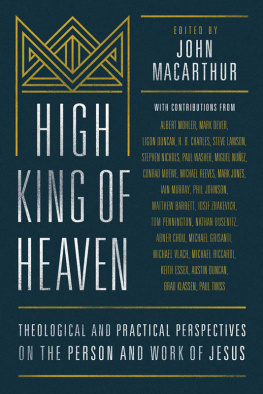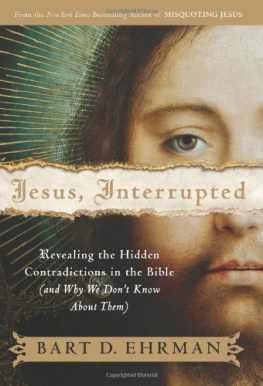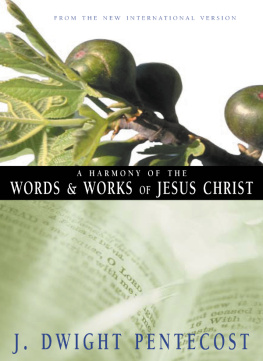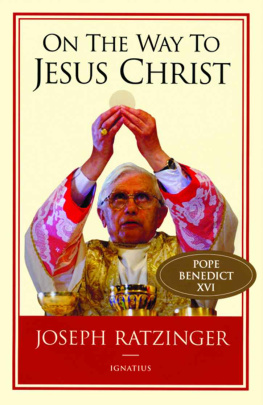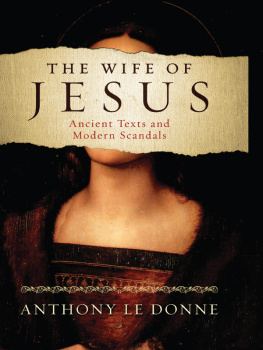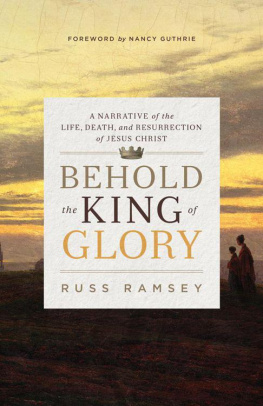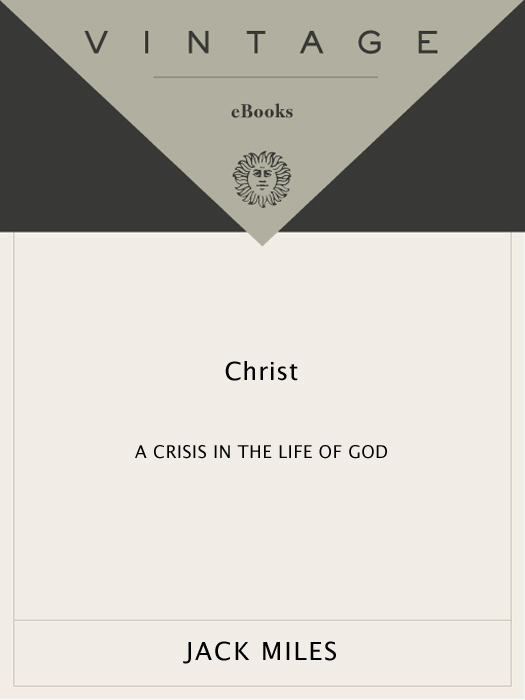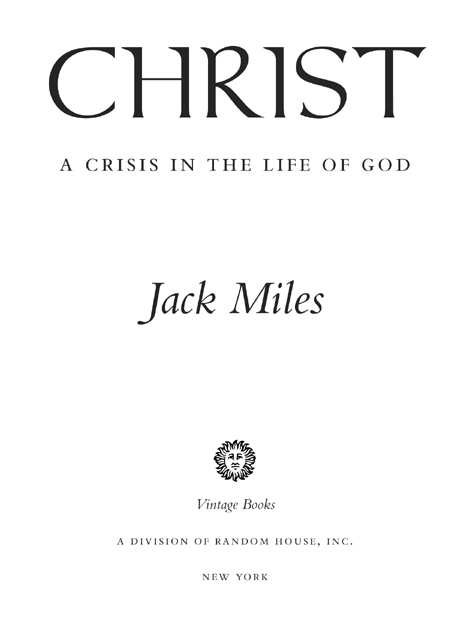Acclaim for Jack Miless
CHRIST
[Jack Miles] is a daring critic. Regardless of our agreement or disagreement with him, he prods us to read these familiar stories afresh, with all their original suspense and drama, his analysis serving as an invitation for our own.
The Christian Science Monitor
As literary interpreters go, Miles does a lovely job. Often thrilling.
St. Louis Post-Dispatch
Brims with ideas, and Miles has a teachers urge to find a profusion of ways to explain those ideas. Let all great religious texts have such enlightened readers.
Daily Telegraph (London)
A literary vision of Christ with more insight, warmth, and verve (not to mention chutzpah), than have been seen for many a year.
America
Christ: A Crisis in the Life of God is, like Miless previous book, a stimulating, challenging work.
San Jose Mercury News
Miles is a master, provocative and accessible, in presenting a God who is ambivalent, hesitant, moody, offhand, remote and opaque: a reluctant supernatural magician. This is the most compelling page-turner of the year.
New York Daily News

Jack Miles
CHRIST
Jack Miles is a writer whose work has appeared in numerous national publications, including The Atlantic Monthly, The New York Times, The Boston Globe, The Washington Post, and The Los Angeles Times, where he served for ten years as literary editor and as a member of the newspapers editorial board. The recipient of a Ph.D. in Near Eastern languages from Harvard University and a former Jesuit, he has been a Regents Lecturer at the University of California, director of the Humanities Center at Claremont Graduate University, and visiting professor of humanities at the California Institute of Technology. His first book, God: A Biography, won a Pulitzer Prize and has been translated into fifteen languages. Currently senior advisor to the president of the J. Paul Getty Trust, a foundation supporting art and scholarship, Dr. Miles lives with his wife and daughter in Southern California.
Also by Jack Miles
GOD: A BIOGRAPHY
FIRST VINTAGE BOOKS EDITION, NOVEMBER 2002
Copyright 2001 by Jack Miles
All rights reserved under International and Pan-American Copyright Conventions. Published in the United States by Vintage Books, a division of Random House, Inc., New York, and simultaneously in Canada by Random House of Canada Limited, Toronto. Originally published in hardcover in the United States by Alfred A. Knopf, a division of Random House, Inc., New York, in 2001.
Vintage and colophon are registered trademarks of Random House, Inc.
The Library of Congress has cataloged the Knopf edition as follows:
Miles, Jack.
Christ: a crisis in the life of God / Jack Miles.1st ed.
p. cm
eISBN: 978-0-307-78910-5
1. IncarnationBiblical teaching. 2. Jesus ChristPerson and officesBiblical teaching. 3. Bible. N.T.Criticism, interpretation, etc.
4. Bible as literature. I. Title.
BT220.M55 2001
232dc21 2001033808
Author photograph Marilyn Sanders
www.vintagebooks.com
v3.1
For
Mary Anne, Terrence,
Catherine, Michael,
and Mary
Contents
Appendix I: One Bible from Many Scriptures
(How It Happened and Why It Matters)
Appendix II: The Bible as Rose Window
(or, How Not to See Through the Bible)
O the hope of Israel,
the saviour thereof in time of trouble.
Why shouldest thou be as a man astonied,
as a mighty man that cannot save?
Jeremiah 14:89
Then said the Jews, Will he kill himself?
because he saith, Whither I go, ye cannot come.
John 8:22
And therefore as himselfe sayd No man can take away my soule And I haue power to lay it downe So without doubt, no man did, nor was there any other than his owne Will, the cause of his dying at that tyme.
John Donne, Biathanatos
PROLOGUE
Crucifixion and the Conscience of the West
A ll mankind is forgiven, but the Lord must die. This is the revolutionary import of the epilogue that, two thousand years ago, a group of radical Jewish writers appended to the sacred scripture of their religion. Because they did so, millions in the West today worship before the image of a deity executed as a criminal, andno less importantother millions who never worship at all carry within their cultural DNA a religiously derived suspicion that somehow, someday, the last will be first, and the first last (Matt. 20:16).
The Crucifixion, the primal scene of Western religion and Western art, has lost much of its power to shock. At this late date, perhaps only a non-Western eye can truly see it. A Japanese artist now living in Los Angeles once recalled the horror most Japanese feel at seeing a corpse displayed as a religious icon, and of their further revulsion when the icon is explained to them. They ask, she said: If he was so good, why did he die like that? In Japanese culture, good people end their lives with a good death, even a beautiful death, like the Buddha. Someone dying in such a hideous wayfor us, he could only be a criminal.
Her perception is correct. The crucifix is a violently obscene icon. To recover its visceral power, children of the twenty-first century must imagine a lynching, the body of the victim swollen and distorted, his head hanging askew above a broken neck, while the bystanders smile their twisted smiles. Then they must imagine that grisly spectacle reproduced at the holiest spot in whatever edifice they call holy. And yet to go even this far is still to miss the meaning of the image, for this victim is not just innocent: He is God Incarnate, the Lord himself in human form.
Winners usually look like winners, and losers like losers. But thanks to this paradoxical feature of the Christian myth, there remains lodged deep in the political consciousness of the West a readiness to believe that the apparent loser may be the real winner unrecognized. In Christianitys epilogue to the God-story that it inherited from Judaism, the Lord God becomes human without ceasing to be the Lord and, unrecognized by all but a few, experiences the human condition at its worst before winning in the end a glorious victory. By losing to Caesar, he wins a duel with the Devil and defeats death itself. The Bible ends as the greatest comedies so often end: with a solemn and festive wedding. The creator of a new heaven and a new earth in which every tear is wiped away becomes the spouse of the entire human race. By losing everything, God wins everything, for everybody, and the last word he speaks, with his bride at his side, is Come!
One of many implications of this epilogue to Gods life story has been that in the West no regime can declare itself above review. All power is conditional; and when the powerless rise, God may be with them. The motif of divinity in disguise is not unique to Christianity; but the Christian motif of unrecognized divinity judicially tried, officially condemned, tortured by his captors, executed in public, buried, and only


